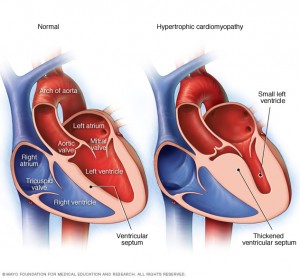Cardiomyopathy is a disease of the heart muscle. It is a condition where the muscle of the heart is abnormal, mostly without there being an obvious cause. There are different varieties of cardiomyopathy presenting with varied symptoms ranging from breathlessness, tiredness, leg swelling, weakness, dizziness or collapse. This condition is diagnosed commonly by echocardigram and cardiac MRI scan. Patients with cardiomyopathy needs a battery of tests to assess the cause and effect of the condition. The treatment of the condition varies depending on the type of Cardiomyopathy- ranging from medications (tablets), fluid restriction to biventricular pacemaker (special 3 chamber pacemaker) to heart transplant.

What is cardiomyopathy?
Cardiomyopathy is a disease of the heart muscle. It is a condition where the muscle of the heart is abnormal without there being an obvious cause.[/vc_column_text][gem_list]There are four main types of cardiomyopathy:
- Hypertrophic Cardiomyopathy (HCM)
- Dilated Cardiomyopathy (DCM)
- Restrictive Cardiomyopathy (RCM)
- Arrhythmogenic Cardiomyopathy (ARVC)
What is Hypertrophic Cardiomyopathy?
Hypertrophic Cardiomyopathy (HCM) is when there is excessive thickening of the heart muscle without any obvious cause (hypertrophy means thickened). In some incidences HCM is inherited, but not always. In other cases, the heart muscle may thicken because of persistently high blood pressure.
What is Dilated Cardiomyopathy?
Dilated Cardiomyopathy (DCM) causes the heart to become dilated or enlarged. As a result the heart may become weak and is unable to pump blood efficiently around the body. In the majority of cases it is unknown why DCM occurs. However excessive alcohol intake is known to be a cause.
What is Arrhythmogenic Right Ventricular Cardiomyopathy?
Arrhythmogenic Right Ventricular Cardiomyopathy (ARVC) is an inherited disorder where the heart muscle cells are gradually replaced by fibrous and fatty tissue. This can eventually cause the heart to dilate and the pumping action of the heart to weaken. There is no known cause for this condition, but it has a tendency to run in families.
What is Restrictive Cardiomyopathy?
Restrictive cardiomyopathy – the least common of the cardiomyopathies – is where the walls of the heart muscle become stiff. This can restrict the flow of blood through the heart, leading to problems with blood flow to the rest of the body. The cause is unknown, but it has been linked to rare metabolic conditions. Recent evidence suggests that the disease may also be caused by a genetic abnormality.
Complications of Cardiomyopathy
Changes in the structure of the heart muscle may lead to problems with the pumping action of the heart, which can sometimes lead to heart failure. Cardiomyopathy may also disrupt the normal electrical pathway in the heart, increasing the risk of abnormal heart rhythms and palpitations.
Living with Cardiomyopathy
Many people with cardiomyopathy are able to continue with their normal life. However some people will experience symptoms and may be at risk of complications. These will vary greatly between each person. It is important therefore to be seen by a cardiologist who will assess each individual case and prescribe treatment if necessary.





